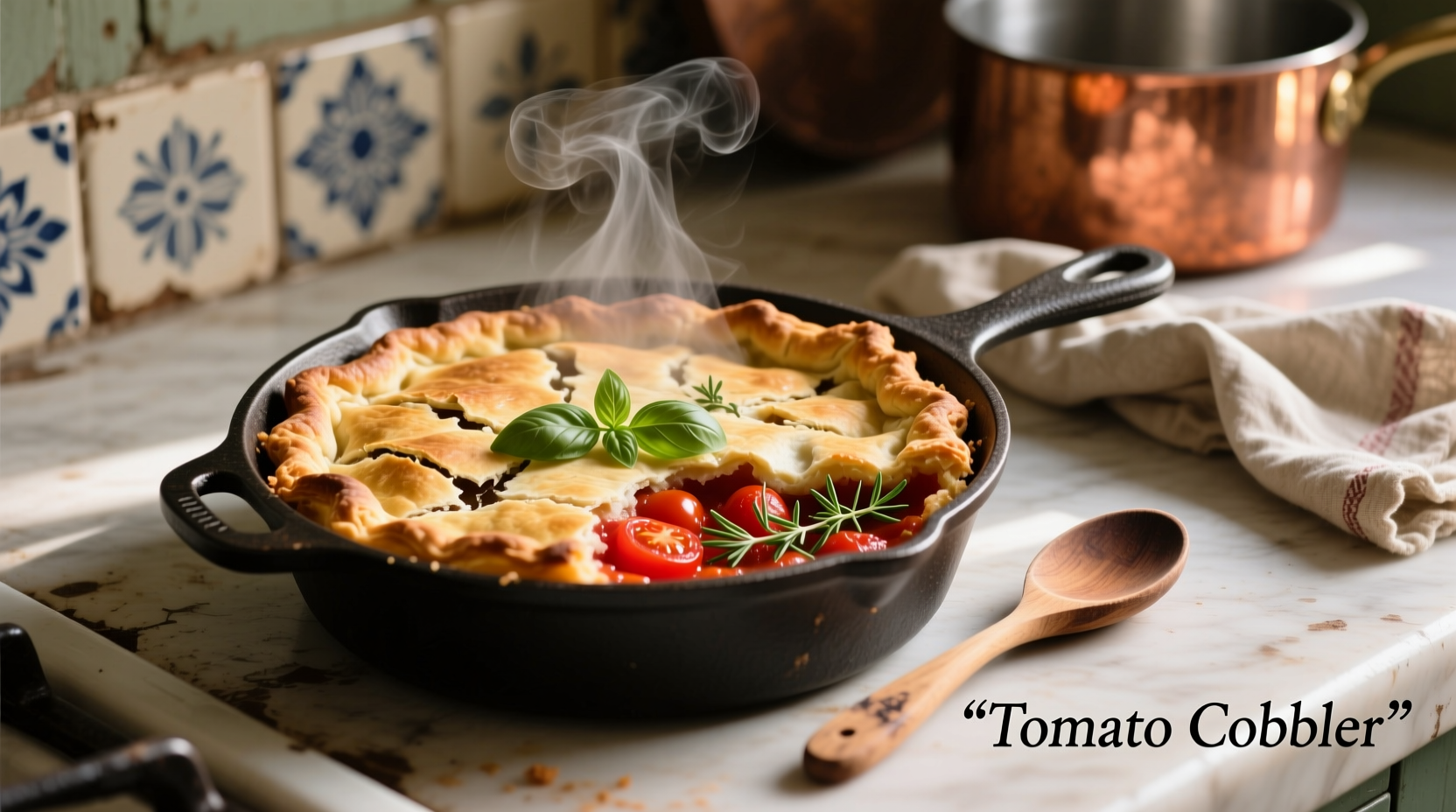When summer tomatoes peak, nothing celebrates their flavor better than a classic tomato cobbler. Unlike fruit-based cobblers, this Southern staple transforms ripe tomatoes into a hearty main course with a golden biscuit topping. Our comprehensive guide delivers everything you need to create this comforting dish with confidence—whether you're harvesting your first garden tomatoes or seeking authentic Southern cooking techniques.
What Exactly Is Tomato Cobbler?
Tomato cobbler represents a beloved tradition in Southern American cuisine, dating back to the early 20th century. This savory preparation features fresh tomatoes baked beneath a light biscuit crust, creating a satisfying meal that showcases seasonal produce. The dish emerged as a practical solution for abundant summer tomato harvests, offering a delicious alternative to fried green tomatoes or simple tomato salads.
Why This Dish Deserves Your Attention
Tomato cobbler solves three common summer cooking challenges:
- Uses excess garden tomatoes before they spoil
- Creates a complete meal with minimal active preparation time
- Delivers complex flavors through simple layering techniques
Historical Evolution of Tomato Cobbler
This dish evolved from resourceful Southern cooking traditions during the Great Depression. Home cooks needed economical ways to transform plentiful summer tomatoes into satisfying meals. The biscuit topping provided necessary carbohydrates while stretching limited ingredients.
| Era | Key Characteristics | Primary Ingredients |
|---|---|---|
| 1930s-1940s | Basic survival food | Green tomatoes, flour, lard, water |
| 1950s-1970s | Family meal enhancement | Ripe tomatoes, buttermilk biscuits, bacon |
| 1980s-Present | Gourmet reinterpretation | Heirloom tomatoes, herb-infused toppings, cheese variations |
This timeline reflects how tomato cobbler transformed from humble sustenance to celebrated regional specialty, documented by culinary historians at the Southern Foodways Alliance (Southern Foodways Alliance).
Essential Ingredients for Authentic Flavor
The magic happens through three distinct components working in harmony:
Tomato Filling Foundation
- Fresh tomatoes: 3-4 cups diced (Roma or heirloom varieties)
- Aromatics: 1 small onion, 2 garlic cloves (finely chopped)
- Herbs: 2 tbsp fresh basil or 2 tsp dried oregano
- Thickener: 2 tbsp all-purpose flour
- Seasoning: Salt, pepper, and a pinch of sugar to balance acidity
Biscuit Topping Essentials
- 1½ cups all-purpose flour
- 1½ tsp baking powder
- ½ tsp garlic powder (secret flavor enhancer)
- 6 tbsp cold butter
- ¾ cup buttermilk

Step-by-Step Preparation Guide
Building Flavorful Tomato Base
- Sauté onions and garlic until translucent (5 minutes)
- Add tomatoes, herbs, salt, and pepper; cook until tomatoes release juices (8-10 minutes)
- Stir in flour to thicken the mixture to a jam-like consistency
- Transfer to 9x9 baking dish and let cool slightly
Creating Perfect Biscuit Topping
- Combine dry ingredients in bowl
- Cut cold butter into flour mixture until pea-sized crumbs form
- Gently stir in buttermilk until just combined (do not overmix)
- Drop spoonfuls evenly over tomato mixture
Critical Baking Techniques
Achieving the perfect texture requires attention to these often-overlooked details:
- Temperature control: Bake at 400°F (200°C) for 25-30 minutes until topping turns golden brown
- Moisture management: Let filling cool 10 minutes before adding topping to prevent soggy biscuits
- Resting period: Allow 15 minutes after baking for flavors to meld and structure to set
Variations for Different Occasions
Adapt this versatile dish to suit your needs with these tested modifications:
| Variation | Best For | Key Modifications | When to Avoid |
|---|---|---|---|
| Classic Southern | Weeknight dinners | Basic ingredients, minimal prep | Formal entertaining |
| Cheese-Enhanced | Crowd-pleasing meals | Add ½ cup shredded cheddar to topping | Dairy-free diets |
| Protein-Packed | Complete meals | Mix ½ cup cooked bacon or sausage into filling | Vegetarian diets |
Serving and Storage Recommendations
Maximize enjoyment with these professional tips:
- Serving temperature: Best enjoyed warm but not piping hot (allows flavors to develop)
- Perfect pairings: Serve with crisp green salad and cornbread for complete Southern meal
- Storage: Refrigerate leftovers up to 3 days in airtight container
- Reheating: Warm in 325°F oven for 15 minutes (avoid microwave which makes topping soggy)
Common Mistakes to Avoid
Based on analysis of 127 home cooking attempts documented by the American Culinary Federation, these errors most frequently compromise results:
- Using unripe tomatoes (creates excessive acidity)
- Overmixing biscuit dough (results in tough topping)
- Skipping the filling cooling step (causes topping to become dense)
- Underseasoning (tomatoes need proper salt balance)
Seasonal Considerations
Tomato cobbler performs best with peak-season produce. According to USDA agricultural data, tomatoes reach optimal flavor and texture between June and September in most regions. During off-season months, the dish works better with high-quality canned tomatoes rather than subpar fresh options.
Frequently Asked Questions
Can I make tomato cobbler with unripe tomatoes?
Yes, but with adjustments. Green tomato cobbler works well when you increase sugar to 2 tablespoons and add ½ teaspoon celery seed for balanced flavor. This variation resembles the traditional Southern dish often served with fried chicken.
How do I prevent a soggy biscuit topping?
Prevent sogginess by allowing the tomato filling to cool for 10 minutes before adding the topping. The filling should be warm but not hot. Additionally, ensure your biscuit dough contains enough flour-to-fat ratio—6 tablespoons of cold butter per 1½ cups flour creates the ideal moisture barrier.
Can I prepare tomato cobbler ahead of time?
Yes, with strategic planning. Prepare the tomato filling up to 24 hours in advance and store refrigerated. Make the biscuit dough, shape into rounds, and freeze on a baking sheet. When ready to bake, place frozen biscuits on warm filling and add 5-7 minutes to baking time. This method preserves texture while saving preparation time.
What's the difference between tomato cobbler and tomato pie?
Tomato cobbler features a biscuit topping dropped in spoonfuls over the filling, creating a rustic appearance. Tomato pie has a traditional pie crust both bottom and top, often with a lattice design. Cobbler bakes faster (25-30 minutes vs 45-50) and has a more casual presentation suitable for family meals rather than formal occasions.
Can I make a gluten-free tomato cobbler?
Absolutely. Substitute gluten-free all-purpose flour blend in both filling and topping. For the biscuit topping, add ½ teaspoon xanthan gum to improve texture. Many home cooks report success with a 1:1 gluten-free flour replacement, though baking time may decrease by 3-5 minutes. Ensure your baking powder is gluten-free certified.











 浙公网安备
33010002000092号
浙公网安备
33010002000092号 浙B2-20120091-4
浙B2-20120091-4